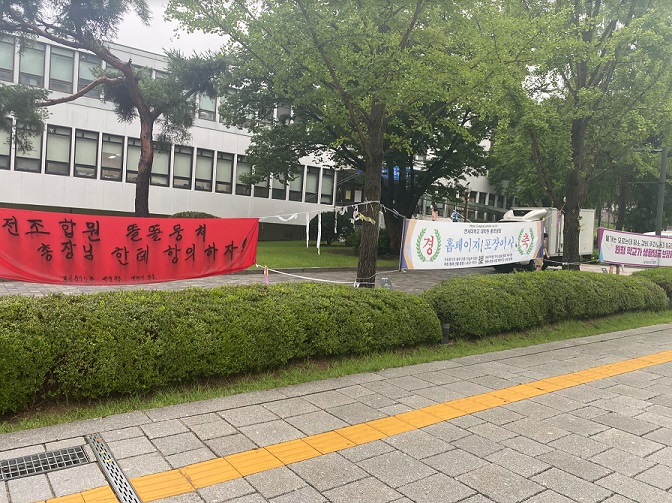
In modern history, South Korea has had a legacy of student led revolutions- from the Gwanju Uprising to the April 19th Revolution, student voices have been the catalysts of change in South Korean culture.
For months now, since March of this year in fact, the cleaning staff and security workers at Yonsei University have been on strike for better working conditions and higher wages. These Yonsei employees are a part of the 공공운수노조 (gong gong oon soo no jo), the Korean Public Service and Transport Worker’s Union (KPTU). Every day during their lunch break, they gather outside the main academic building, 백양관 (baek yang gwan) wearing their red vests and banging on pots and pans, chanting phrases demanding better terms of employment. Sometimes they even parade around campus. These employees are advocating for themselves because they are facing heavier workloads because of layoffs and are asking for access to basic rights, such as showers. The union has a huge flag and there are often people giving speeches.
백양관 is actually where I have two of my classes around that time, so I have observed these union protesters for the last six weeks. When the union starts to gather, the security officers of 백양관 become tense and stand at the main entrance in case any union protesters try to go in the building and disrupt the classes going on with their chants and noise. All of the other doors to 백양관 are closed and padlocked during this time.
However, Yonsei University is one of the three most prestigious universities in South Korea and it surprises me that they have let their workers go on like this for so long. Even worse, three Yonsei University students became fed up with the KPTU’s racket and filed a criminal lawsuit along with three civil lawsuits for invading their right to learn and for traumatizing them.
Yes, the union caused some disruption to student learning, but personally I think that these three students went about this situation in the wrong way, not only with the lawsuit, but also by claiming that the union’s protest was “traumatizing them.” The union is made up of elderly Korean men and women, people’s grandparents, who are too old to be working as hard as they are. “Trauma” is a strong word. Seeing people advocate for their rights should be eye opening, not traumatizing, since it is a peaceful protest.
Instead of filing a lawsuit, which obviously hasn’t stopped the protesting or made things better for the workers, use your big brain to do something about it.
As a Yonsei student, the university’s title has prestige and power that will gain attention and is able to advocate for those who aren’t taken seriously. Since the lawsuits, there has been much backlash against these three students as being selfish for only caring about their own rights. Many Yonsei students have signed a petition supporting the workers and some Yonsei alumni who became lawyers have provided legal support in combating the lawsuits. With the backing of Yonsei students and alumni, the union has gained some ground, but they still have a long way to go in the struggle for their rights as employees. The university hasn’t been taking care of its workers and the union protesters are rightfully standing up for themselves in the face of unfair treatment. Wouldn’t you do the same thing if you were in their position?